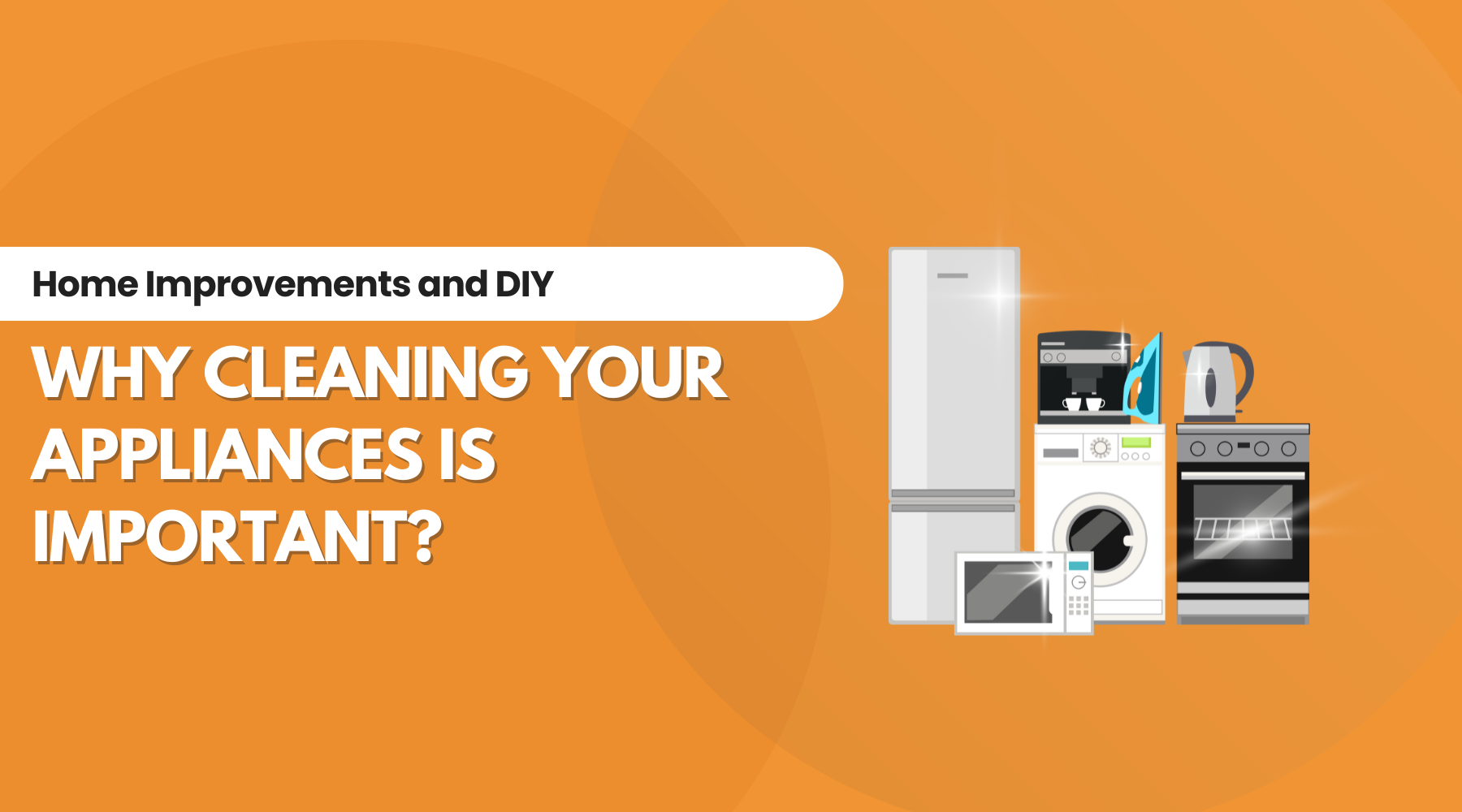
Why Cleaning Your Appliances Is Important?
Keeping your home appliances clean is more than just a matter of appearance—it boosts efficiency, improves hygiene, and saves money. Here’s why cleaning your appliances regularly is essential for every homeowner.
1. Improves Efficiency and Performance
Clean appliances operate more effectively and use less energy.
-
A clean refrigerator maintains optimal cooling temperatures.
-
A clean oven heats evenly for better cooking results.
-
Removing dust and grime prevents blockages that strain motors or heating elements in washers, dryers, and dishwashers.
2. Extends Appliance Lifespan
Routine cleaning can significantly extend the life of your appliances.
-
Dirt and debris cause wear and tear over time.
-
Regular maintenance helps avoid costly breakdowns or early replacement.
3. Saves Money on Energy and Repairs
Clean appliances consume less power and are less likely to malfunction.
-
Energy-efficient machines reduce electricity and water bills.
-
Prevents expensive repairs or full replacements.
4. Promotes Hygiene and Home Safety
Unclean appliances can pose health and safety risks.
-
Food build-up in microwaves, ovens, and fridges may cause bacterial growth and bad odours.
-
Lint in dryers increases the risk of house fires.
5. Improves Performance Results
Clean appliances give better results in daily tasks.
-
Dishwasher's clean dishes more thoroughly.
-
Washing machines leave clothes fresher and cleaner.
-
Coffee makers brew tastier coffee when descaled and residue-free.
How Often Should You Clean Your Coffee Machine?
To keep your coffee tasting fresh and your machine running efficiently, you should clean your coffee maker after every use and deep clean it at least once a month. Daily cleaning involves rinsing the brew basket, carafe, and any removable parts with warm, soapy water to prevent coffee oil build-up and mould. A monthly deep clean—using a descaling solution or vinegar—removes mineral deposits (limescale) that can clog the internal components and affect both performance and flavour. Whether you’re using a drip coffee maker, espresso machine, or single-serve brewer, regular maintenance ensures better-tasting coffee and extends the life of your appliance.
How Often Should You Clean Your Fridge?
Cleaning your fridge regularly is essential for food safety, freshness, and energy efficiency. Experts recommend giving your refrigerator a deep clean every 3 to 4 weeks. This includes removing all food, wiping down shelves and drawers with warm soapy water or a baking soda solution, and checking for expired items. Spills should be cleaned up immediately to prevent odours and bacterial growth. Don’t forget to clean the fridge door seals and exterior handles weekly, as they can harbour germs from frequent use. For optimal performance, vacuum the condenser coils (usually located at the back or bottom) every 6 months to prevent dust build-up that can make your fridge work harder. A clean fridge not only keeps your food fresher longer—it also helps your appliance run more efficiently.
How Often Should You Clean Your Dishwasher?
To keep your dishwasher running efficiently and smelling fresh, it’s recommended to clean it once a month. Over time, food particles, grease, soap scum, and mineral deposits can build up inside your machine, clogging the filter and spray arms, and leading to unpleasant odours or poor cleaning results. A quick monthly clean should include wiping down the door seals, removing and scrubbing the filter, and running a hot cycle with dishwasher cleaner or vinegar to break down grime and limescale. Regular cleaning not only improves performance but also extends the life of your appliance and keeps your dishes sparkling clean.
How Often Should You Clean Your Cooker?
Your cooker is the heart of your kitchen, and keeping it clean is essential for both hygiene and performance. Ideally, you should wipe down your cooker after every use to remove food splatters, grease, and spills before they harden. A weekly clean of the hob, control knobs, and surrounding surfaces helps prevent stubborn build-up and keeps everything looking fresh. For a more thorough clean—including oven cavities, burner rings, and grill trays—aim to do a deep clean every 1 to 3 months, depending on how often you cook. Regular cooker maintenance not only improves safety and efficiency but also extends the life of your appliance. Stay on top of your cleaning routine to enjoy a spotless, high-performing cooker all year round.
How Often Should You Clean Your Tumble Dryer?
Keeping your tumble dryer clean is essential not just for performance, but for safety, too. Experts recommend cleaning the lint filter after every use to maintain airflow and prevent fire hazards. In addition, the dryer drum and exterior should be wiped down once a month to remove any dust or residue. Most importantly, the dryer vent and exhaust duct should be thoroughly cleaned at least every 3 to 6 months, depending on usage. If you notice longer drying times or a burning smell, it's a sign your dryer may be overdue for a deep clean. Regular maintenance helps extend the life of your appliance, reduces energy bills, and ensures safe, efficient operation. Don’t wait for problems—make dryer cleaning a part of your home care routine.
How Often Should You Clean Your Air Fryer?
To keep your air fryer working efficiently and safely, you should clean it after every use. Grease, food crumbs, and oil residue can quickly build up in the basket, tray, and heating element, leading to smoke, unpleasant odours, and even potential fire hazards. After each use, allow the appliance to cool, then wash the basket and tray with warm soapy water or place them in the dishwasher (if dishwasher-safe). Wipe down the interior and heating coil weekly to prevent stuck-on grease and carbon build-up. Regular cleaning not only ensures better-tasting food but also extends the life of your air fryer.
How Often Should You Clean Your Oven?
Cleaning your oven regularly is key to keeping your kitchen safe, your food tasting great, and your appliance running efficiently. As a general rule, you should deep clean your oven every 3 to 6 months, depending on how often you cook. However, if you notice smoke, unpleasant odors, or burnt food residue, it’s time for a clean—no matter the schedule. For those who bake or roast frequently, a monthly wipe-down of the oven interior and door can prevent stubborn grease buildup. Don’t forget to clean oven racks and check the fan if you have a convection model. A clean oven not only cooks more evenly but also improves energy efficiency and extends the appliance’s lifespan. Regular oven cleaning is a small step that makes a big difference in your kitchen.
How Often Should You Clean Your Freezer?
Regularly cleaning your freezer is key to keeping your frozen food safe and your appliance running efficiently. It’s recommended to deep clean your freezer every 3 to 6 months, depending on how full it stays and how often it’s opened. Start by defrosting (if it’s not a frost-free model), then wipe down the interior with a mild cleaner or a solution of baking soda and water to remove spills, frost build-up, or food residue. Check for expired or freezer-burned items and reorganize to maintain good airflow. Don’t forget to clean the door seals and exterior as well. A clean freezer not only helps maintain consistent temperatures but also reduces energy usage and extends the life of the appliance. Stay on top of your freezer maintenance to keep it fresh, efficient, and food-safe.
Keep Your Kitchen Running Smoothly
Staying on top of appliance cleaning isn’t just about appearances—it’s about safety, hygiene, and efficiency. Whether it’s wiping down your cooker after meals, deep cleaning your oven every few months, or defrosting your freezer twice a year, a consistent cleaning routine can save you money, prevent costly repairs, and keep your kitchen functioning at its best. Set reminders, create a checklist, and make cleaning a habit—not a hassle. Your appliances work hard for you every day—show them some regular care, and they’ll reward you with years of reliable service.
